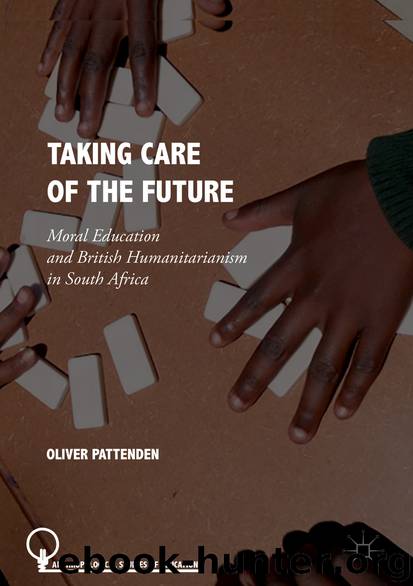Taking Care of the Future by Oliver Pattenden

Author:Oliver Pattenden
Language: eng
Format: epub
Publisher: Springer International Publishing, Cham
Like other prominent supporters now living in the UK, Susan had previously lived in Africa. She was born in England but conceived in Nigeria, when her father was teaching engineering at the time of the independence in 1960. During this same conversation, she said, “I have a love of Africa”. Clearly, these experiences and this judgement provided foundations to the events she depicted in her statement.
As she mentioned, Susan was affected by an episode of The Vicar of Dibley, a BBC sitcom, which aired in 2005; it transformed her, she hoped to “get involved”. During the episode, Dawn French, who plays the vicar, is trying to get her friends and parishioners to write to Tony Blair in support of the Make Poverty History campaign, which marked the twentieth anniversary of the Live 8 concert and received a vast amount of British media coverage. Britain used to send ‘needy children’ to her colonies.9 More recently, much emphasis has been placed on bringing ‘similar youngsters’ back under her care through the extension of charitable and developmental interventions. At the end of the episode, a plea for assistance towards such ends is made. The characters gather around a laptop, and the vicar shows them an extract from the documentary film The Orphans of Nkandla, a town in KwaZulu-Natal, South Africa, which subsequently gained notoriety for President Jacob Zuma’s expensive rural home in the same area. The footage focuses on two young brothers whose mother has died of AIDS (Woods and Shipley 2004). An interviewer asks the brothers “Do you miss your mum?” They answer, “Yes … she did everything [for us]”. Because their Dad is also dying, they say that they now have to “do everything” (Dennis 2005: 44–48). Susan told me that when she learnt of Ngomso sometime later, during a presentation in Birmingham, Mary’s words resonated with her because of the programme. Her engagements with the film and Mary’s presentations relate to Bornstein and Redfield’s (2008: 1) consideration of the compassionate and empathetic “impulse to alleviate suffering known as humanitarianism [that] constitutes a central element in international moral discourse”. This discourse, they (2008: 4–5) argue, has a “temporal tendency … to focus on the present, and the immediate needs of living humans in distress”, while emphasising “the physical (and increasingly the psychological) condition of suffering people above all else”. In being moved to react compassionately to the film and later to Mary’s depiction of the suffering learners at Ngomso, Susan wanted to “do something” to alleviate their distress.10
Anthropologists and ethnographers have considered ‘orphans’ and relationships of care in South Africa (Henderson 2012; Weckesser 2011), Ethiopia (Abebe 2008), Tanzania (Stambach and Kwayu 2013), and Botswana (Dahl 2006). This work problematises the narrative of the programme that encouraged Susan to “get involved” (also see Bornstein 2012: 87–111; Hosegood 2008; Meintjes and Giese 2006; Riley 2013). The term ‘orphans’ is an “unstable category” that unravels with an understanding of its applicability to individual lives, social contexts, and culturally specific notions of vulnerability and kinship (Green 2011: 35; also see Dahl 2006; Henderson 2012).
Download
This site does not store any files on its server. We only index and link to content provided by other sites. Please contact the content providers to delete copyright contents if any and email us, we'll remove relevant links or contents immediately.
The Art of Coaching Workbook by Elena Aguilar(51199)
Trainspotting by Irvine Welsh(21666)
Twilight of the Idols With the Antichrist and Ecce Homo by Friedrich Nietzsche(18633)
Fangirl by Rainbow Rowell(9251)
Periodization Training for Sports by Tudor Bompa(8273)
Change Your Questions, Change Your Life by Marilee Adams(7783)
This Is How You Lose Her by Junot Diaz(6887)
Asking the Right Questions: A Guide to Critical Thinking by M. Neil Browne & Stuart M. Keeley(5775)
Grit by Angela Duckworth(5615)
Red Sparrow by Jason Matthews(5474)
Paper Towns by Green John(5191)
Room 212 by Kate Stewart(5122)
Ken Follett - World without end by Ken Follett(4733)
Housekeeping by Marilynne Robinson(4447)
The Sports Rules Book by Human Kinetics(4388)
Papillon (English) by Henri Charrière(4274)
Double Down (Diary of a Wimpy Kid Book 11) by Jeff Kinney(4272)
The Motorcycle Diaries by Ernesto Che Guevara(4102)
Exercise Technique Manual for Resistance Training by National Strength & Conditioning Association(4071)
